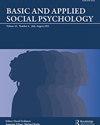God and the Jab: Religion is Associated With COVID-19 Vaccinations Rates in England
IF 1.8
3区 心理学
Q2 PSYCHOLOGY, SOCIAL
引用次数: 0
Abstract
AbstractReligious areas were predicted to be negatively associated with COVID-19 vaccinations. Using public data on religion and vaccination rates within local authorities in England, support for the hypothesis was found. All major religious groups within England (i.e., Christianity, Buddhist, Hindu, Jewish, Muslim, Sikh, and “other” religious groups) were negatively associated with COVID-19 vaccination rates. Effects were stronger for Muslim and Christian areas than areas with other religious groups. Effects were not due to wealth, household size, mobility, or age. These results suggest that religious regions in general and regions with Muslims and Christians in particular are negatively associated with COVID-19 vaccination rates. These findings can be used as a guide for future research and to help inform vaccination efforts. Disclosure statementNo potential conflict of interest was reported by the author(s).Data accessibility statementAll data are freely available through their original sources (see references).上帝和疫苗:宗教与英格兰COVID-19疫苗接种率有关
宗教地区与COVID-19疫苗接种呈负相关。通过使用英格兰地方当局的宗教和疫苗接种率的公共数据,发现了对这一假设的支持。英格兰境内所有主要宗教团体(即基督教、佛教、印度教、犹太教、穆斯林、锡克教徒和“其他”宗教团体)与COVID-19疫苗接种率呈负相关。与其他宗教团体相比,穆斯林和基督教地区的影响更大。这些影响与财富、家庭规模、流动性或年龄无关。这些结果表明,一般宗教地区,特别是穆斯林和基督徒地区,与COVID-19疫苗接种率呈负相关。这些发现可以作为未来研究的指南,并有助于为疫苗接种工作提供信息。披露声明作者未报告潜在的利益冲突。数据可访问性声明所有数据均可通过其原始来源免费获取(参见参考文献)。
本文章由计算机程序翻译,如有差异,请以英文原文为准。
求助全文
约1分钟内获得全文
求助全文
来源期刊

Basic and Applied Social Psychology
PSYCHOLOGY, SOCIAL-
CiteScore
4.50
自引率
12.50%
发文量
7
期刊介绍:
Basic and Applied Social Psychology (BASP) emphasizes the publication of outstanding research articles, but also considers literature reviews, criticism, and methodological or theoretical statements spanning the entire range of social psychological issues. The journal will publish basic work in areas of social psychology that can be applied to societal problems, as well as direct application of social psychology to such problems. The journal provides a venue for a broad range of specialty areas, including research on legal and political issues, environmental influences on behavior, organizations, aging, medical and health-related outcomes, sexuality, education and learning, the effects of mass media, gender issues, and population problems.
 求助内容:
求助内容: 应助结果提醒方式:
应助结果提醒方式:


